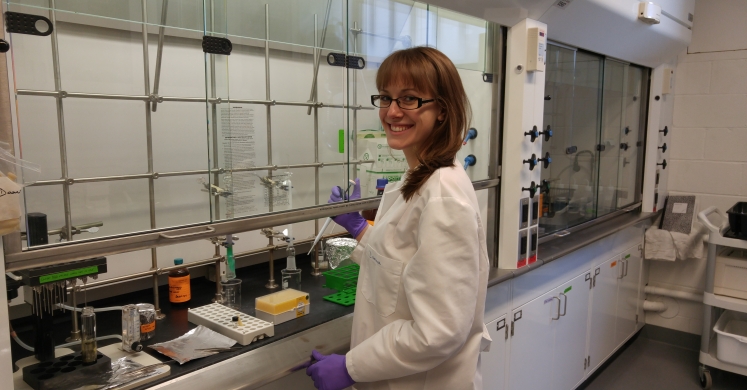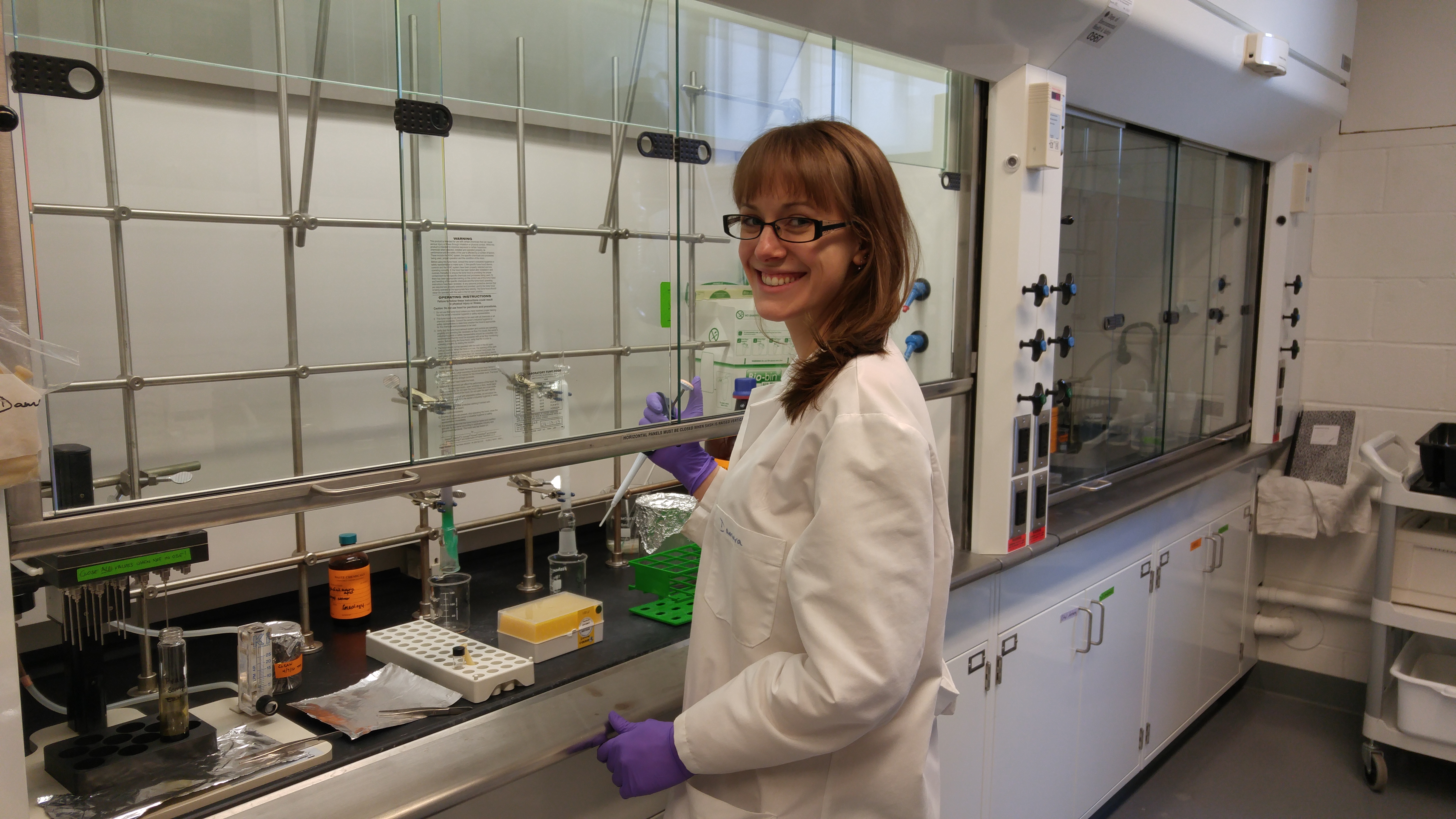Phipps Stories

Interview with a Scientist: Damara Strong and Heather Buechel
If there is one segment of society that is often misunderstood, it is people who work in science fields. Public perception of scientists tends to lean towards lab coats, crazy hair, and beakers full of chemicals, especially in the eyes of children. In reality, most scientists are just regular people who want to make the world a better place through scientific discovery. The best way to dispel the myth that scientists are boring or crazy is to get to know them; the purpose of this segment is to talk with real scientists to ask them what they love about their jobs and why they think their work is fun and important.
This weekend we will be featuring our Science Communication Fellows, Damara Strong and Heather Buechel, at our "Meet a Scientist" public program. The Science Communication Fellowship program at Phipps seeks to bring scientists and public audiences together in face-to-face public interactions that promote appreciation and understanding of current scientific research and its application. As part of this programming, Phipps will be hosting a "Meet a Scientist" public program this Saturday, April 16th from 1:30 until 3:30 PM in the Tropical Forest Palm Circle, where visitors can engage with our science communication fellows and learn all about their research and occupations and even see the very instruments and equipment utilized everyday by scientists. Let's get to know the fellows!
Science Communication Fellow, Damara Strong

I am a Ph.D. candidate in the Department of Geology and Environmental Science at the University of Pittsburgh. My research is focused in precipitation changes with a warming global climate in dry regions, such as Central Mexico and the American Southwest. I use plant leaf wax molecules deposited in lake sediments to determine how precipitation is reflected within the leaf wax molecule. When I started studying environmental science, I learned about how climate change could impact humans and the environment, including through the onset of severe drought causing depletion of natural resources. The direct impact of climate change to the world inspired me to get involved in the research and educate people on the impacts of climate change.
Why did you become a scientist?
I became a scientist because I had a deep curiosity for how the world works, and I realized how much information is left to be discovered. The exact moment I decided to become a scientist, I was volunteering with dolphin rehabilitation in Key Largo, Florida – when I first heard a baby dolphin using echolocation, I knew I wanted to learn more about the natural world.
What is the most exciting thing you’ve ever done at work?
When I was doing research at my undergraduate institution, I was invited to help take samples from the Snowmastodon site in Snowmass, Colorado. At the research site, there was a large team of volunteers digging up bones from extinct animals of the Ice Age, including mammoths, mastodons, and large ground sloths. Being a part of such a large, collaborative project was very exciting, particularly when the film crews were stopping by to record the monumental discovery.
What skills do you use in your job?
I use a large variety of skills, including but not limited to communication, writing, data interpretation, and problem solving. My job includes everything from working outdoors taking samples, to careful chemical lab work, data analysis and reporting my results. Besides doing my research, I sometimes get to teach and participate in outreach to teach others about the environment.
What is your favorite part of your job?
I would honestly have to say outreach and education is my favorite part of my job. I love teaching people what I do and what information scientists have to contribute to the world. I love inspiring people and getting them interested in pressing science and environmental topics. If I can inform the world, I will be fulfilled.
If you weren’t a scientist, what would you be?
If I weren’t a scientist, I would be a humanitarian worker and/or human rights journalist. I have a strong interest in traveling and human rights. I am someone who wants to help everyone if I have the resources to do so. My current research and the effects of modern climate change has only further opened my eyes the importance of work in human rights and social justice, such as drought and sea level change contributing to mass migrations of human populations.
Why is science education important?
Science education not only informs, but inspires children and adults alike to understand and discover more about this world. My topic of climate change is very important due to the current political and social climate surrounding the issue. If I can educate the community to understand the consequences of many of our actions, I can help foster a generation, and future generations, of people making decisions for the good of the planet and the human race.
Science Communication Fellow, Heather Buechel
Hi! My name is Heather Buechel. I am a post doctoral researcher in the immunology department at the University of Pittsburgh. I also teach incoming Pitt freshmen biology lab. I studied hippocampal memory as a graduate student at the university of Kentucky, and I now study natural killer T cells of the immune system. When I’m not doing science, you never know what you’ll find me doing – I like to get my hands into everything.
Why did you become a scientist?
I became a scientist because I enjoy both working with my hands, and keeping my brain busy. I like asking and answering questions, troubleshooting and building things. I like to talk, and teach and learn new things. I like to be challenged! Science is great for all of these things, and it also has a relatively flexible schedule, which is a great perk for someone who is not friends with the morning!
What is the most exciting thing you’ve ever done at work?
As a graduate student, I studied sleep and memory in rats. To study sleep, I implanted a wireless emitter onto the surface of the rats’ brains, and into their muscles. The surgery took about an hour and a half, and the rats fully recovered in about a week. After surgery, the rats learned to swim in a big pool called a water maze. It tested how well they could remember how to get out of the water. I got to observe their brain and muscle activity in real time, as well as play in the water with rats. And technically, I got to call myself a brain surgeon. How cool is that?
What skills do you use in your job?
I use both specialized and general skills at work. However, every skill that I use could be learned by anyone - they only takes practice. Science uses a wide range of skills from speaking and writing to following protocols and data analysis. The most important skill, in my opinion is patience!
What is your favorite part of your job?
My favorite part of my job, honestly, is planning or trouble shooting problems with my lab mates. It’s always amazing to me how much better a few brains do when trying to figure out how to plan a project or figure out what went wrong with an experiment!
If you weren’t a scientist, what would you be?
If I were not a scientist, I have a lot of back up plans! I think I would enjoy being a writer or a cake decorator, maybe a long haul truck driver or a coffee shop owner. If professional traveler/ blogger was a little more reliable of a career, I’d be first in line! Whatever it is, it would have to be both busy and make me think – as long as I have that combination, I’m happy.
Why is science education important?
For me, science is not only a subject to study and a way to understand the world better, but it also can be a confidence builder (and destroyer!!) because you’re always coming up with ideas, testing them, then either celebrating or reformulating. A career in science keeps you balanced. It teaches you patience and critical thinking. It lets you become comfortable with both success and failure. Science education not only teaches you about the world, but it teaches you a lot about yourself as well. Many of the skills and methods that scientists use, work well in other areas of life.
If you'd like to learn more about our Science Communication fellows and their work stop by the Tropical Forest Palm Circle on Saturday, April 16th from 1:30 until 3:30 PM for our "Meet a Scientist" Public Program.
Photographs provided by Science Communciation Fellows.

